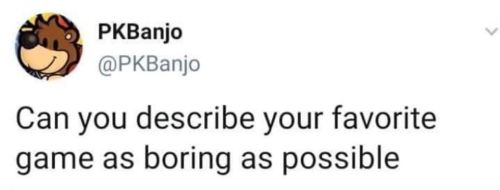
one-braincell-in-use
I go by he/him, call me Micah! Minor, student, and professional procrastinator.
55 posts
Latest Posts by one-braincell-in-use


The Virgin Mary by José Luis Castillo
idk what kills me more the fact that haggar is canonically considered hot (which 100% valid) or the fact that zarkon is probably media trained and shows up to random talk shows/game shows all charismatic and full of life after destroying worlds
there's also the possibility that lotor is considered those annoying nepo babies that get video essays made about his contribution to the empire and how talentless he is and how he's only well known bc his dad is the zarkon destroyer of all worlds.
the whole concept of this episode is so silly but also kinda the idea (the political side I mean) I wanted when it came to the media and propaganda spreading aspect of the empire.
IM GAY IM GAY IM GAY IM GAY IM GAY IM GAY

Let’s say a prayer for
Someone that is currently contemplating suicide
Someone that has just attempted suicide
Someone that is fighting for their life in hospital after a suicide attempt
Someone that has recently heard that their family member / friend / partner has attempted suicide
Someone that has recently heard that their family member / friend / partner has lost their life due to a suicide attempt
Someone that has died due to a suicide attempt
Someone that is struggling to access mental health resources
Someone that is struggling to have the people in their life take their mental health conditions seriously
Someone that is currently struggling in a psychiatric ward (or similar)
Someone that has recently been diagnosed with a mental health condition
Someone that is struggling with side effects from new medication for a mental health condition
Someone that is facing workplace discrimination because of a mental health condition
Someone that is facing discrimination at school/college/university because of a mental health condition
Someone that is experiencing financial difficulties due to having a mental health condition
Someone that is struggling with self harm or an eating disorder
When I say "king behavior" I usually mean something Jesus would do

Just an experiment. Reblog if you actually give a fuck about male victims of domestic violence and rape.
Of fucking course
What sick bastard doesn’t
a lot of people on tumblr and Ao3 seem to think Christianity (mainly Catholicism) is just a cool and sexy esthetic narrative force to make your characters guilty and repressed and I'm just like...
hey what about the grace? the grace of God? the grace God gave specifically so we wouldn't need to be guilty and repressed? God's grace? that grace? do they have that grace?

anywasy i made this meme to represent what just happened rn
Everyone is fighting a tough battle so reblog to give previous a sword 🗡️
We live in a beautiful world created by God.
Seing this pin

And listening to
Like WOW
Varian deserves that song wayyyyyyyyyyy more than Light does
Tips for writing flawed but lovable characters.
Flawed characters are the ones we root for, cry over, and remember long after the story ends. But creating a character who’s both imperfect and likable can feel like a tightrope walk.
1. Flaws That Stem From Their Strengths
When a character’s greatest strength is also their Achilles' heel, it creates depth.
Strength: Fiercely loyal.
Flaw: Blind to betrayal or willing to go to dangerous extremes for loved ones.
“She’d burn the whole world down to save her sister—even if it killed her.”
2. Let Their Flaws Cause Problems
Flaws should have consequences—messy, believable ones.
Flaw: Impatience.
Result: They rush into action, ruining carefully laid plans.
“I thought I could handle it myself,” he muttered, staring at the smoking wreckage. “Guess not.”
3. Show Self-Awareness—or Lack Thereof
Characters who know they’re flawed (but struggle to change) are relatable. Characters who don’t realize their flaws can create dramatic tension.
A self-aware flaw: “I know I talk too much. It’s just… silence makes me feel like I’m disappearing.” A blind spot: “What do you mean I always have to be right? I’m just better at solving problems than most people!”
4. Give Them Redeeming Traits
A mix of good and bad keeps characters balanced.
Flaw: They’re manipulative.
Redeeming Trait: They use it to protect vulnerable people.
“Yes, I lied to get him to trust me. But he would’ve died otherwise.”
Readers are more forgiving of flaws when they see the bigger picture.
5. Let Them Grow—But Slowly
Instant redemption feels cheap. Characters should stumble, fail, and backslide before they change.
Early in the story: “I don’t need anyone. I’ve got this.”
Midpoint: “Okay, fine. Maybe I could use some help. But don’t get used to it.”
End: “Thank you. For everything.”
The gradual arc makes their growth feel earned.
6. Make Them Relatable, Not Perfect
Readers connect with characters who feel human—messy emotions, bad decisions, and all.
A bad decision: Skipping their best friend’s wedding because they’re jealous of their happiness.
A messy emotion: Feeling guilty afterward but doubling down to justify their actions.
A vulnerable moment: Finally apologizing, unsure if they’ll be forgiven.
7. Use Humor as a Balancing Act
Humor softens even the most prickly characters.
Flaw: Cynicism.
Humorous side: Making snarky, self-deprecating remarks that reveal their softer side.
“Love? No thanks. I’m allergic to heartbreak—and flowers.”
8. Avoid Overdoing the Flaws
Too many flaws can make a character feel unlikable or overburdened.
Instead of: A character who’s selfish, cruel, cowardly, and rude.
Try: A character who’s selfish but occasionally shows surprising generosity.
“Don’t tell anyone I helped you. I have a reputation to maintain.”
9. Let Them Be Vulnerable
Vulnerability adds layers and makes flaws understandable.
Flaw: They’re cold and distant.
Vulnerability: They’ve been hurt before and are terrified of getting close to anyone again.
“It’s easier this way. If I don’t care about you, then you can’t leave me.”
10. Make Their Flaws Integral to the Plot
When flaws directly impact the story, they feel purposeful rather than tacked on.
Flaw: Their arrogance alienates the people they need.
Plot Impact: When their plan fails, they’re left scrambling because no one will help them.
Flawed but lovable characters are the backbone of compelling stories. They remind us that imperfection is human—and that growth is possible.
Writing Tips
Punctuating Dialogue
✧
➸ “This is a sentence.”
➸ “This is a sentence with a dialogue tag at the end,” she said.
➸ “This,” he said, “is a sentence split by a dialogue tag.”
➸ “This is a sentence,” she said. “This is a new sentence. New sentences are capitalized.”
➸ “This is a sentence followed by an action.” He stood. “They are separate sentences because he did not speak by standing.”
➸ She said, “Use a comma to introduce dialogue. The quote is capitalized when the dialogue tag is at the beginning.”
➸ “Use a comma when a dialogue tag follows a quote,” he said.
“Unless there is a question mark?” she asked.
“Or an exclamation point!” he answered. “The dialogue tag still remains uncapitalized because it’s not truly the end of the sentence.”
➸ “Periods and commas should be inside closing quotations.”
➸ “Hey!” she shouted, “Sometimes exclamation points are inside quotations.”
However, if it’s not dialogue exclamation points can also be “outside”!
➸ “Does this apply to question marks too?” he asked.
If it’s not dialogue, can question marks be “outside”? (Yes, they can.)
➸ “This applies to dashes too. Inside quotations dashes typically express—“
“Interruption” — but there are situations dashes may be outside.
➸ “You’ll notice that exclamation marks, question marks, and dashes do not have a comma after them. Ellipses don’t have a comma after them either…” she said.
➸ “My teacher said, ‘Use single quotation marks when quoting within dialogue.’”
➸ “Use paragraph breaks to indicate a new speaker,” he said.
“The readers will know it’s someone else speaking.”
➸ “If it’s the same speaker but different paragraph, keep the closing quotation off.
“This shows it’s the same character continuing to speak.”
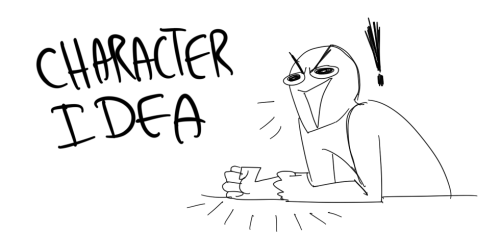
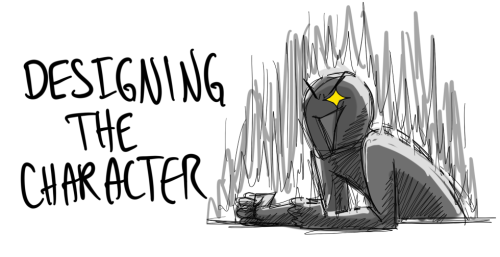
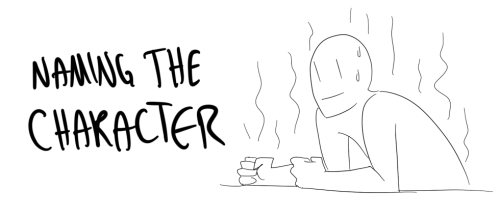
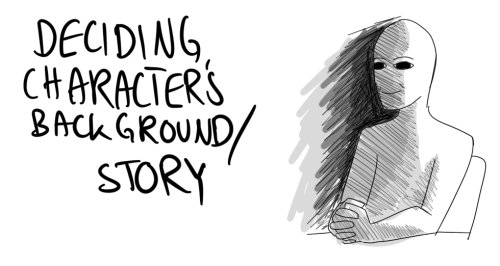
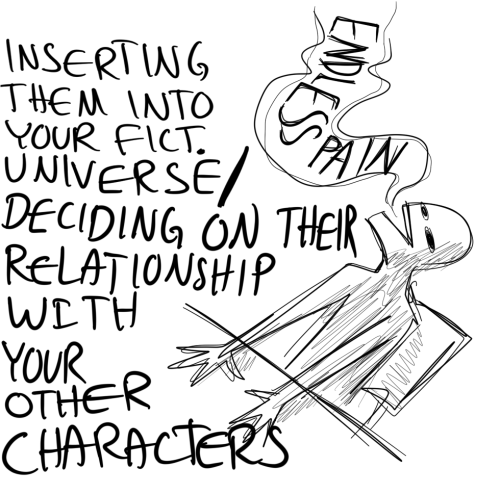
the suffering never ends

Our sweetness and our hope
Too Christian for the queers. Too queer for the Christians. It’s a hard road that we walk, isn’t it?
If there's one thing I hate, it's when conservative Christians use their subpar understanding of the Bible to justify bigotry and hatred.
If there's ANOTHER thing I hate, it's when atheist spew the same rhetoric.
Just Because You're An Atheist! It Doesn't Mean You Inherently Have Good Biblical Literacy!
Obviously it's great that you don't believe the same bigotry and hatred as the conservative Christians... however, you're still agreeing with their understanding of God?
You still are not putting the Bible into it's cultural and historical context! There are plenty of things in the bible that do not and should not be applied to the context of today.
When you agree that the Christian God hates queer people, trans people, supports slavery and genocide. Guess what? That helps absolutely no one.
You aren't smart because you are incapable of separating the church as an institution (that has 100% caused harm) and the core values of what Christianity actually is (LOVE THY NEIGHBOUR!).
When you say that God hates gay people from your atheist perspective, I understand that isn't a bother to you as you don't believe in God. When queer Christians who DO believe in God AND have queer, religious trauma hear that, it's so hurtful and insensitive.
You are simply spitting the same harmful rhetoric as the conservative Christians, but without the belief in God.






clark reupload
edit: forgot the sweater comic
🚨 We Need Your Kindness to Survive 🚨
Hello, My name is Mosab Elderawi, and I live in Gaza with my family. Life here has become harder than I ever imagined, and I’m writing this with hope in my heart that you might hear our story.
The ongoing war has devastated my family. We’ve lost 25 family members—each one a beloved part of our lives, taken too soon. I miss them deeply—their laughter, their presence, their love. Every day is a reminder of this unimaginable loss.

64.media.tumblr.com

64.media.tumblr.com

64.media.tumblr.com

64.media.tumblr.com

64.media.tumblr.com
We are now facing daily challenges to survive—things that most people take for granted, like food, clean water, and a safe place to sleep. The harsh realities of life here have replaced our dreams with the constant fight for survival.
Our Current Situation:
💔 Lost Stability: The war has left us without work or a stable source of income. 🍞 Basic Needs: Food and water are becoming harder to afford with rising prices and scarce resources. 📚 Dreams on Hold: Like so many here, my family’s dreams have been replaced by the need to simply survive. 😢 Unimaginable Loss: Losing 25 loved ones has left a void that can never be filled.
How You Can Help:
I’m sharing our story with the hope that someone out there might care. Even $5 can make a big difference for us, and if you’re unable to donate, just reblogging this post can help spread the word.
Your kindness, no matter how small, is something we’ll never forget.
What This Means to Us:
Your support is not about changing our entire situation—it’s about giving us a little relief, a little hope, and a way to keep going. We are not asking for much, and we understand if you can’t donate. Sharing our story is just as valuable to us as a donation.
Thank you for reading this far. It means the world to us to know that someone is listening. Your kindness gives us strength and helps us believe in a better tomorrow.
With all our gratitude, Mosab Elderawi and Family ❤️
✅️ Vetted by ✅️
@gazavetters, my number verified on the list is ( #309 )✅️

@fancysmudges @brokenbackmountain @just-browsing1222-deactivated20 @mothblossoms @aleciosun @fluoresensitive @khizuo @lesbiandardevil @transmutationisms @schoolhater @timogsilangan @appsa @buttercuparry @sayruq @malcriada @palestinegenocide @sar-soor @akajustmerry @annoyingloudmicrowavecultist @feluka @tortiefrancis @flower-tea-fairies @tsaricides @riding-with-the-wild-hunt @visenyasdragon @belleandsaintsebastian @ear-motif @kordeliiius @brutaliakhoa @raelyn-dreams @troythecatfish @theropoda @tamarrud @4ft10tvlandfangirl @queerstudiesnatural @northgazaupdates2 @skatezophrenic @awetistic-things @camgirlpanopticon @baby-girl-aaron-dessner @nabulsi @sygol @junglejim4322 @heritageposts @chososhairbuns @palistani @dlxxv-vetted-donations @illuminated-runas @imjustheretotrytohelp
Writing Advice: How To Trauma
In seeing the recent explosion of my "How To Write Trauma With Humanity" post, I have decided to jump back into this topic!
This cute post will be covering how to write complicated individuals with Trauma. From the good, the bad, and especially the ugly since people tend to assume that victimhood is inherently seperated from assholehood
A) Being A Person And Afraid
In my experience, the majority of people with trauma have simultaneously existing fears and desires that often contradict, complicate, or outright hurt themselves.
I call them "fear combinations"
It's these fear combinations that cause people with trauma to often act in ways that seem confusing to outsiders.
For example, the person that's always on the hunt for a relationship but whenever an opportunity for romance strikes, they create relationship havok so the relationship can end
Or a person tries to always sincerely bring attention to themselves but whenver the attention is on them, they just shrug it off as not being worthy of it
This behavior seems kinda weird until you stop to take a closer look at their psyche.
Example 1 is based off of my character, Monday Vũ who has a tendency of jumping into relationships with a sincere desire to find romance until the honeymoon period ends as Monday realizes that if the relationship continues they might have to settle down, forgo their entire identity, and all of their freedom. Then they sabotage the relationship under the guise that it's a selfless endeavour.
Example 2 is based off my character, Niko Preyr who uses grand public gestures and his friendships to prop himself up as a person to be known but if you ever spoke to him then you would quickly see one of the most insecure yet attention-hungry individuals you have ever seen.
"Fear Combinations" are an excellent device in making your characters complex. In my opinion, the trauma-writing scene is just a little bit too neat in it's displays of trauma. It's too logical. It doesn't feel real to my personal experiences.
"he has trust issues because of trauma" What if he also had issues with being clingy to people he sees as trust-worthy?
What if your characters weren't so easy to understand? But I hear you wondering.
How? How do these people manifest such confusing behavior? Why should I add this into my characters?
I'll tell you
B) Instinct Vs Terror, Fighting Against Yourself
In my opinion, "fear combinations" are either caused by the distortion of a human fear or the event in which an intrinsic desire is contrasted against a "survival method".
Humans are born with certain "intrinsic" fears and desires. Humans are born with a desire for belonging, a desire for vulnerability, a desire for self-fulfillment, a desire for independence, a desire for security in themselves.
And with desire comes the fear of "missing out". The fear that you want something that everyone wants but for some reason you won't be able to get it. The fear that you'll loose it. And the fear that your desire might put you into danger. What if you get rejected? What if you never find that group? What if you never find freedom?
In not-traumatized individuals, while it may take some introspection, people can and often do reconcile their fears and desires in a movie-montage when they're children with the help of a strong support system.
In traumtized individuals, what tends to happen is that either the fear of lose and the fear of gain tend to be increased to unpredencented levels
Either that, or a lack of a strong support system doesn't allow the child to safely confront their fears in order to get what they want.
This causes "fear combination"
Niko Preyr has the natural desire to be validated as "good", as "special", as "worthy". A desire we are all born with. However, his upbringing convinced him that he is underserving of what we all need. This causes Niko Preyr to use attention as validation. However whenever he receives this attention, his gifted fear that he is undeserving causes him to reject the attention. But he continues searching for attention to serve that need for validation. A hellish cycle.
Monday Vũ has two understandable fears that we all have. The fear of losing two necessary things: indepedence and security. Monday fears being abandoned, fears being engulfed into relationships. While children and adults can often reconcile those fears in their childhood through a strong support system, Monday never had that. Instead she had her father who emotionally left her and her mother who literally left her. Monday only had herself to rely on, at least thats how she felt. And now, as an adult, Monday wants to fulfill that desire we all have. To be loved. To be connected. But she's afraid. Afraid of being blindsided. Afraid of not having the last laugh. Afraid of being apart of something.
What if that loner wolf found someone who they think is perfect. Someone worthy of their trust. Do you really think that all those years of yearning for love, for connection, are just going to be smothered when they have the perfect person to unleash their childish, half-developed, horrifying emotions onto?
But what next? After we have our character's contradictory fears and desires, after we have the justification for why they feel like this, what's next?
It's this:
C) Self-Destructive Habits: Why We Understand And Can't Change
Let me tell you, unless in very specific conditions such as certain personality disorders and so on, people tend to understand that their behavior is foolish, illogical, and hurting other people.
Monday knows that betraying other people, hurting their trust and faith in their relationships, and entering relationships when she understands her history is bad. It makes her a bad person.
Niko knows that their habits are actively hurting their chances at finding worth.
That "Lone Wolf" understands, deep down, that no single person can handle the high expectations and emotions.
They know it because they can see it. Many times. Monday can see that characters in movies who have their relationship history tend to be casted as the antagonist. Niko can hear the gossip. That "Lone Wolf" can see the way that their loved ones cracked under the pressure and guilt.
So why do they do it? It feeds into their idea of the world. It feeds into what they want to be perceived as. It feeds into their stagnancy.
If Monday can ignore how they hurt others, then they can live under the Martyr label for the rest of their life without having to come to term with the fact that this isn't selflessness, it's called being pathetic.
If Niko can ignore how deep that hurt goes, then they never have to actually make the effort to change. To take that potential and make themselves into something. To be responsible.
If "Lone Wolf" can ignore how nobody can meet their expectations without crumbling down, then they use everyone's failure to feed into their cynical, self-hating notion of how nobody's trustworthy. How they don't have the responsibility of being considerate.
basic things you should know about your main characters
how is their relationship with their family
what are their beliefs, if they have any
what is their motivation (preferably something unrelated to their love interest/romantic feelings)
who were they raised to be vs. who they became/are becoming
what are their plans for the future, if they have any
how they feel about themselves and how it affects their behaviour
how do they feel about things they cannot control
and last but not least: Why is This Character the Protagonist??
Writing Notes: Flat & Round Characters

Flat Characters - Consist of only a few features (usually based on clichés). They’re generally static characters meant to serve the story.
Round Characters - Have depth. They have weaknesses, strengths, flaws, fears, tastes, and dreams. They are well characterized in order to seem real. They're dynamic and change over time. They feel affected by the story’s events because they suffer their consequences and learn from them which makes them more realistic and believable.
The use of flat characters
Flat characters are often used in TV comedies (30-minute sitcoms with canned laughter) because comedic stories usually focus on the anecdote and the joke.
Thanks to their commonplace situations and characters, sitcoms are able to transmit a sense of familiarity to the spectator.
Flat characters also have a supporting role in stories with round main characters in order to achieve one of these effects:
Fast recognition: You need your readers/audience to easily recognize the type of characters you are presenting.
Contrast: Flat and/or static characters can highlight the internal or external evolution of round characters.
When to avoid flat characters
Unless you’re specifically looking for one of the previous effects listed for flat characters, it’s best that your characters (especially the protagonists) are round in order for your readers to identify with them.
Creating round and deep characters
Consider the following:
1. Internal Changes
Do your characters undergo any internal changes throughout the story?
Think about their situation at the beginning of the story.
Is it the same as it is at the end? It shouldn’t be.
They can be worse or better, but the story’s events should have affected them in some way.
2. External Changes
Do the external circumstances surrounding your characters change throughout the story?
Just as their personalities suffer variations, their external conditions should as well.
For example, one of your characters could be a farmer at the beginning of the story and then become a warrior by the end.
3. Goals
What do your characters want?
They should have a conscious desire – something that moves them into action.
4. Wishes
What do your characters need?
Regardless of what they think they want, there’s something they need at an unconscious level – something different from what they consciously desire.
That contradiction will bring depth to your fictional heroes.
5. Achievements
What do your characters attain?
Do they achieve any of their goals?
How does that affect them?
If you have the answer to the last question, you’ll have a clearer idea of how the story’s events have changed their way of facing life.
For instance, if they achieve what they wanted at the beginning of the tale but that’s not what they really need, they can learn from their mistakes and try to correct them.
However, they might also give into frustration.
6. Weaknesses
What are their weaknesses?
Everybody makes mistakes and has fears and flaws, so if you want your characters to be more believable, they’d better have weak points and see themselves in need of facing them if possible.
Your characters overcoming these weaknesses or not depends on the story you want to tell and on the type of evolution you want them to experience.
Some overcome them and progress while others don’t and fail. The contrast between them is what makes the story more believable.
7. Strengths
What are their strengths?
Apart from weaknesses, your characters can have strong points they may or may not know about.
Sometimes, they discover them and learn how to make the most of them.
Other times, they do not know, and it leads them to failure.
You, as a writer, should be clear about those strengths and so should your readers be in order to better understand your characters.
8. Conflicts
What’s your characters’ inner conflicts?
Once you’ve answered the previous seven areas of question, you’ll find this one easier to answer.
Every good character must deal with an inner conflict throughout the story such as a mental debate between what they need and what they want or a moral struggle between what they’re trying to attain and what they consider correct.
This type of dilemma makes your characters interesting, and their experiences can turn into life lessons for your readers.
Source Writing References: Worldbuilding ⚜ Plot ⚜ Character ⚜ "Well-Rounded Character" Worksheet ⚜ On Conflict
Of course!
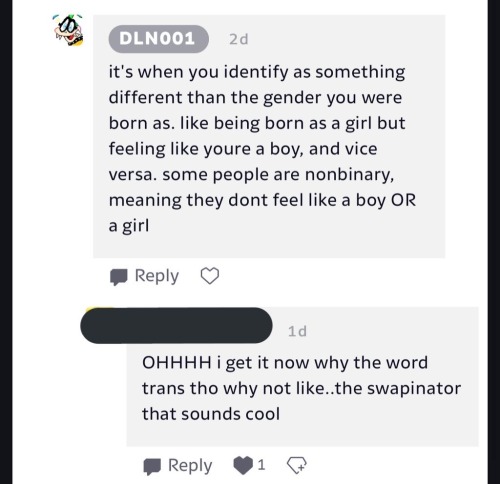
reblog if you believe fanfics are as valid as books that were published and sold by authors who write as their main careers. I'm trying to prove a point
reblog if you’ve read fanfictions that are more professional, better written than some actual novels. I’m trying to see something
The Entirety of Tumblr from Tumblr has been Chucked in to the ocean! You're all wet now.


